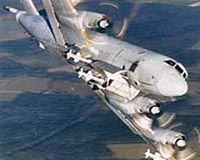 |
Pasadena CA (JPL) Aug 10, 2009 Radar imaging at NASA's Goldstone Solar System Radar on June 12 and 14, 2009, revealed that near-Earth asteroid 1994 CC is a triple system. Asteroid 1994 CC encountered Earth within 2.52 million kilometers (1.56 million miles) on June 10. Prior to the flyby, very little was known about this celestial body. 1994 CC is only the second triple system known in the near-Earth population. A team led by Marina Brozovic and Lance Benner, both scientists at NASA's Jet Propulsion Laboratory in Pasadena, Calif., made the discovery. 1994 CC consists of a central object about 700 meters (2,300 feet) in diameter that has two smaller moons revolving around it. Preliminary analysis suggests that the two small satellites are at least 50 meters (164 feet) in diameter. Radar observations at Arecibo Observatory in Puerto Rico, led by the center's director Mike Nolan, also detected all three objects, and the combined observations from Goldstone and Arecibo will be utilized by JPL scientists and their colleagues to study 1994 CC's orbital and physical properties. The next comparable Earth flyby for asteroid 1994 CC will occur in the year 2074 when the space rock trio flies past Earth at a distance of two-and-a-half million kilometers (1.6 million miles). Of the hundreds of near-Earth asteroids observed by radar, only about 1 percent are triple systems. Share This Article With Planet Earth
Related Links NEOs at JPL Space Technology News - Applications and Research
 Raytheon Wins Prime Contract For Advanced Airborne Sensor
Raytheon Wins Prime Contract For Advanced Airborne SensorDallas TX (SPX) Aug 07, 2009 The U.S. Navy has awarded a multi-year contract authorizing Raytheon to begin development of the Advanced Airborne Sensor, the follow-on to the Littoral Surveillance Radar System (LSRS). The AAS program will equip the P-8A Poseidon, the Navy's next patrol maritime aircraft. LSRS is currently operational on Navy P-3C Orions; the AAS will provide airborne radar surveillance with next-generat ... read more |
|
| The content herein, unless otherwise known to be public domain, are Copyright 1995-2009 - SpaceDaily. AFP and UPI Wire Stories are copyright Agence France-Presse and United Press International. ESA Portal Reports are copyright European Space Agency. All NASA sourced material is public domain. Additional copyrights may apply in whole or part to other bona fide parties. Advertising does not imply endorsement,agreement or approval of any opinions, statements or information provided by SpaceDaily on any Web page published or hosted by SpaceDaily. Privacy Statement |